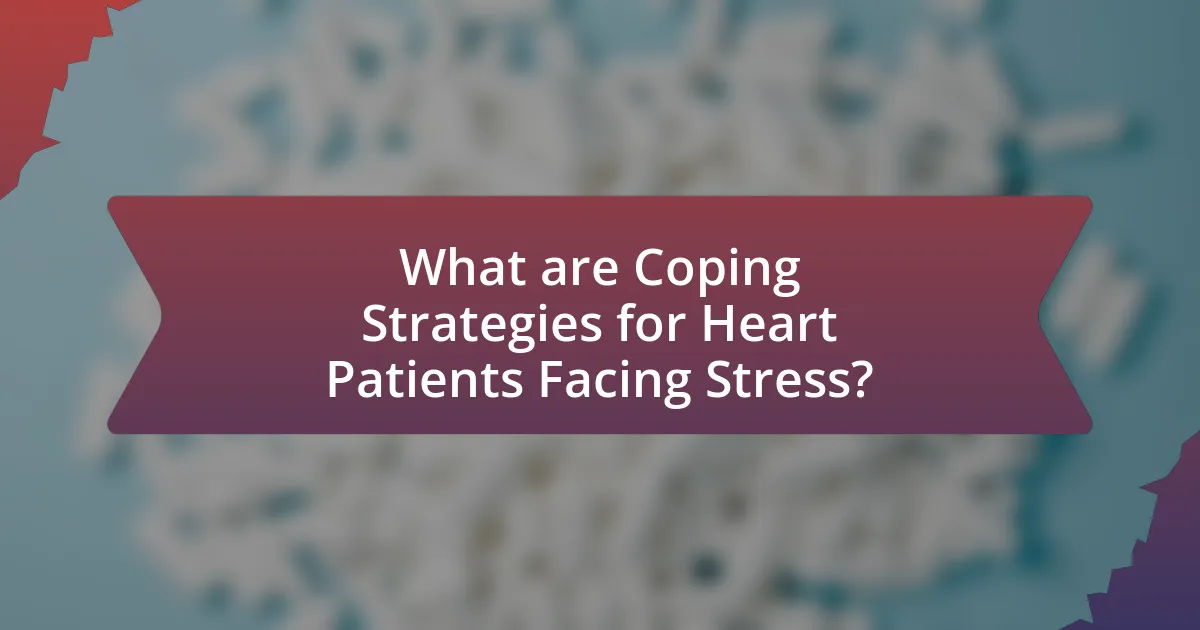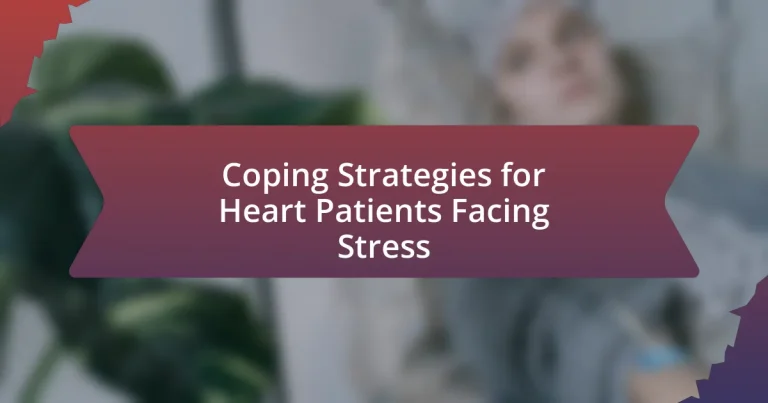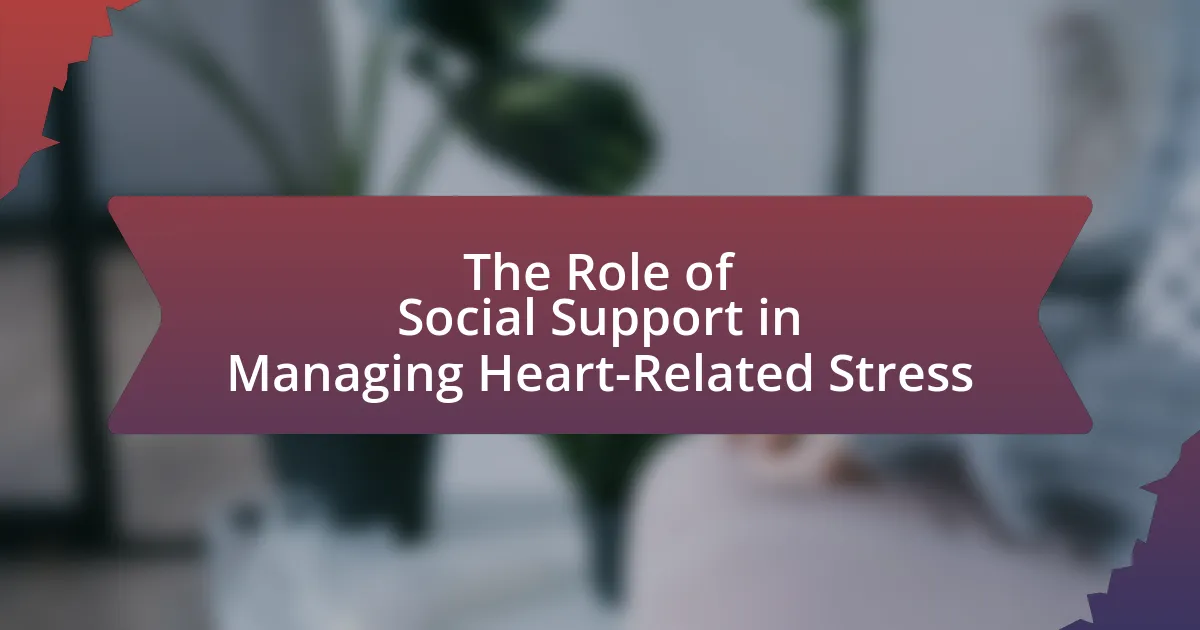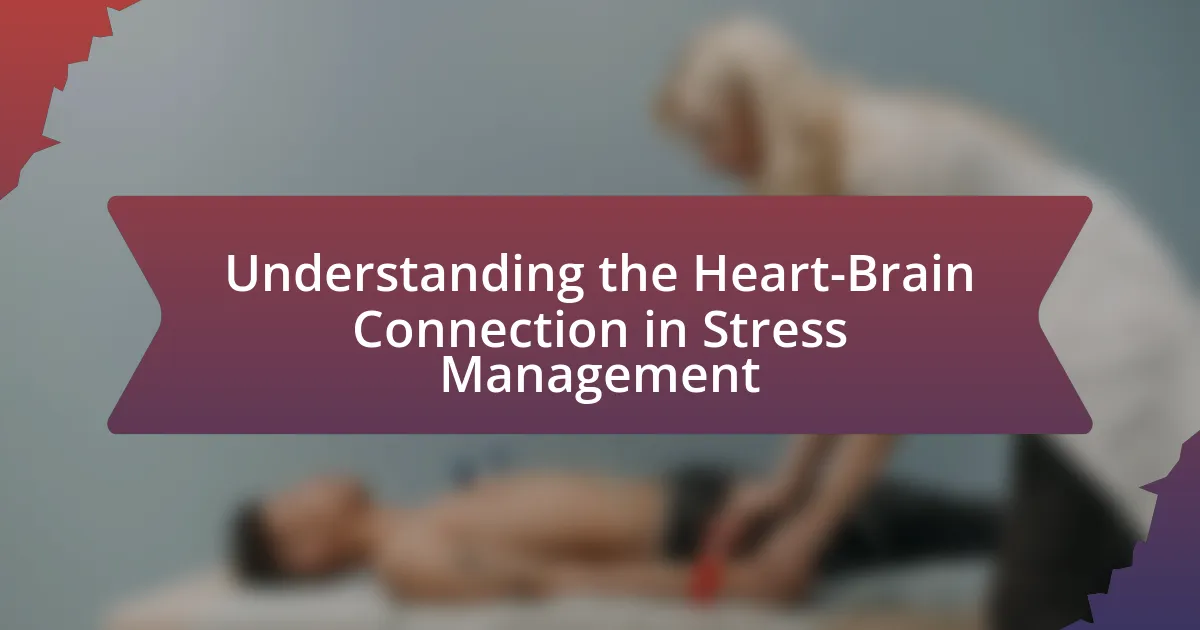Coping strategies for heart patients facing stress are essential for maintaining cardiovascular health and overall well-being. Key strategies include practicing relaxation techniques such as deep breathing and meditation, engaging in regular physical activity, and adhering to a heart-healthy diet. The article explores the relationship between stress and heart health, detailing the physiological effects of stress on the heart and the importance of stress management for heart patients. It also discusses various coping mechanisms, including psychological strategies, social support, and community resources, while highlighting the role of mindfulness and relaxation techniques in reducing stress levels. Additionally, the article addresses barriers to effective stress management and offers practical tips for heart patients to develop personalized stress management plans.

What are Coping Strategies for Heart Patients Facing Stress?
Coping strategies for heart patients facing stress include practicing relaxation techniques, engaging in regular physical activity, and maintaining a healthy diet. Relaxation techniques such as deep breathing, meditation, and yoga can significantly reduce stress levels, which is crucial for heart health. Regular physical activity, recommended by the American Heart Association, helps improve cardiovascular fitness and reduces anxiety. Additionally, a heart-healthy diet rich in fruits, vegetables, whole grains, and lean proteins supports overall well-being and can mitigate stress-related health risks. These strategies are supported by research indicating that lifestyle modifications can enhance emotional resilience and improve heart health outcomes.
How do stress and heart health relate to each other?
Stress negatively impacts heart health by increasing the risk of cardiovascular diseases. When an individual experiences stress, the body releases hormones such as cortisol and adrenaline, which can lead to elevated heart rate and blood pressure. Chronic stress has been linked to inflammation and the development of atherosclerosis, a condition characterized by the buildup of plaque in the arteries. Research published in the Journal of the American College of Cardiology indicates that individuals with high stress levels are more likely to suffer from heart attacks and other cardiovascular events. Therefore, managing stress is crucial for maintaining heart health and reducing the risk of heart-related issues.
What physiological effects does stress have on the heart?
Stress has several physiological effects on the heart, primarily increasing heart rate and blood pressure. When an individual experiences stress, the body releases stress hormones such as adrenaline and cortisol, which stimulate the heart to beat faster and constrict blood vessels, leading to elevated blood pressure. This response is part of the “fight or flight” mechanism, which prepares the body for immediate action. Chronic stress can lead to long-term cardiovascular issues, including increased risk of heart disease, heart attacks, and stroke, as sustained high blood pressure and heart rate can damage blood vessels and the heart muscle itself. Studies indicate that individuals with high stress levels are more likely to develop heart-related conditions, underscoring the importance of managing stress for heart health.
Why is it important for heart patients to manage stress?
It is important for heart patients to manage stress because high stress levels can lead to increased heart rate and blood pressure, which may exacerbate existing heart conditions. Chronic stress has been linked to a higher risk of heart disease, as it can contribute to inflammation and the buildup of plaque in the arteries. Studies indicate that stress management techniques, such as mindfulness and relaxation exercises, can significantly improve cardiovascular health outcomes by reducing these physiological responses. For instance, research published in the Journal of the American College of Cardiology found that patients who engaged in stress-reduction programs experienced lower rates of heart-related complications.
What types of coping strategies are available for heart patients?
Heart patients can utilize various coping strategies to manage stress effectively. These strategies include cognitive-behavioral techniques, which help patients reframe negative thoughts and develop healthier perspectives; relaxation techniques such as deep breathing, progressive muscle relaxation, and mindfulness meditation, which reduce anxiety and promote emotional well-being; and social support systems, where patients engage with family, friends, or support groups to share experiences and receive encouragement. Research indicates that these coping strategies can significantly improve the quality of life and emotional health of heart patients, as evidenced by studies showing reduced anxiety and depression levels among those who actively employ these techniques.
What are the psychological coping strategies for managing stress?
Psychological coping strategies for managing stress include cognitive restructuring, mindfulness, and problem-solving techniques. Cognitive restructuring involves identifying and challenging negative thought patterns, which can reduce anxiety and improve emotional responses. Mindfulness practices, such as meditation and deep-breathing exercises, help individuals focus on the present moment, thereby decreasing stress levels. Problem-solving techniques encourage individuals to break down stressors into manageable parts, allowing for effective solutions. Research indicates that these strategies can significantly enhance emotional well-being and resilience in stressful situations, particularly for heart patients who may experience heightened stress due to their health conditions.
How can physical activity serve as a coping strategy?
Physical activity serves as a coping strategy by reducing stress and improving mental health through the release of endorphins, which are natural mood lifters. Engaging in regular exercise has been shown to decrease anxiety and depression levels, as evidenced by a study published in the Journal of Clinical Psychiatry, which found that individuals who participated in physical activity reported lower levels of stress and improved emotional well-being. Additionally, physical activity can enhance resilience by providing a structured routine and a sense of accomplishment, further aiding heart patients in managing stress effectively.
What role does social support play in coping with stress?
Social support plays a crucial role in coping with stress by providing emotional, informational, and practical assistance, which can significantly reduce the negative effects of stress. Research indicates that individuals with strong social support networks experience lower levels of anxiety and depression, which are common responses to stress. For instance, a study published in the Journal of Health and Social Behavior found that social support is associated with better mental health outcomes and improved coping strategies among individuals facing stressful situations. This support can come from family, friends, or community resources, and it enhances resilience, enabling individuals to manage stress more effectively.
How can family and friends assist heart patients in managing stress?
Family and friends can assist heart patients in managing stress by providing emotional support, encouraging healthy lifestyle choices, and facilitating relaxation techniques. Emotional support from loved ones can reduce feelings of isolation and anxiety, which are common among heart patients. Studies show that social support can lead to better health outcomes, including lower blood pressure and improved heart function. Encouraging heart patients to engage in regular physical activity, maintain a balanced diet, and adhere to medical advice can also alleviate stress. Additionally, family and friends can help by introducing relaxation techniques such as mindfulness, meditation, or yoga, which have been proven to lower stress levels and improve overall well-being.
What community resources are available for heart patients?
Community resources available for heart patients include support groups, educational programs, and rehabilitation services. Support groups, such as those offered by the American Heart Association, provide emotional support and shared experiences among patients. Educational programs often cover topics like heart-healthy living and stress management, helping patients understand their condition better. Cardiac rehabilitation services, typically provided by hospitals or community health centers, offer supervised exercise and lifestyle counseling tailored to heart patients. These resources are essential for improving patient outcomes and enhancing quality of life.
How can mindfulness and relaxation techniques help heart patients?
Mindfulness and relaxation techniques can significantly benefit heart patients by reducing stress and improving emotional well-being. These practices lower blood pressure, decrease heart rate, and enhance overall cardiovascular health. Research published in the Journal of the American College of Cardiology indicates that mindfulness-based stress reduction can lead to improved heart function and reduced anxiety levels in patients with heart disease. Additionally, a study by the American Heart Association found that relaxation techniques, such as deep breathing and guided imagery, can lower cortisol levels, which are linked to heart disease risk. Thus, incorporating mindfulness and relaxation into the care regimen of heart patients can lead to measurable improvements in their health outcomes.
What are some effective mindfulness practices for heart patients?
Effective mindfulness practices for heart patients include deep breathing exercises, guided imagery, and body scan meditation. Deep breathing exercises help reduce stress and lower heart rate by promoting relaxation; studies show that controlled breathing can significantly decrease anxiety levels. Guided imagery involves visualizing peaceful scenes, which can enhance emotional well-being and reduce stress, as evidenced by research indicating that such techniques can improve heart health outcomes. Body scan meditation encourages awareness of bodily sensations, helping patients identify areas of tension and promote relaxation, which is crucial for heart health management. These practices collectively contribute to better stress management and overall cardiovascular health.
How does deep breathing impact stress levels in heart patients?
Deep breathing significantly reduces stress levels in heart patients by activating the body’s relaxation response. This physiological response lowers heart rate and blood pressure, which are critical for heart health. Research indicates that deep breathing exercises can decrease cortisol levels, a hormone associated with stress, thereby promoting a sense of calm. A study published in the Journal of Clinical Psychology found that heart patients who practiced deep breathing reported lower anxiety and improved emotional well-being, demonstrating the effectiveness of this technique in managing stress.
What are the barriers to effective stress management for heart patients?
Barriers to effective stress management for heart patients include lack of access to mental health resources, inadequate support systems, and limited knowledge about stress management techniques. Heart patients often face financial constraints that hinder their ability to seek therapy or counseling, as indicated by a study published in the Journal of the American College of Cardiology, which found that 30% of patients reported financial barriers to accessing mental health services. Additionally, many heart patients may not have a strong support network, which is crucial for emotional well-being, as social support has been shown to reduce stress levels and improve health outcomes. Furthermore, a lack of awareness or education about effective stress management strategies, such as mindfulness or relaxation techniques, can prevent patients from utilizing these tools, leading to increased stress and potential health risks.
How can heart patients overcome common obstacles to stress management?
Heart patients can overcome common obstacles to stress management by implementing structured coping strategies such as mindfulness, regular physical activity, and social support. Mindfulness practices, including meditation and deep-breathing exercises, have been shown to reduce stress levels significantly; a study published in the Journal of the American College of Cardiology found that mindfulness can lower blood pressure and improve heart health. Regular physical activity, as recommended by the American Heart Association, not only enhances physical well-being but also releases endorphins that help alleviate stress. Additionally, maintaining strong social connections can provide emotional support, which is crucial for managing stress; research indicates that individuals with robust social networks experience lower levels of anxiety and depression. By integrating these strategies, heart patients can effectively navigate the challenges of stress management.
What misconceptions about stress management should heart patients be aware of?
Heart patients should be aware that one common misconception about stress management is that it solely involves relaxation techniques, such as deep breathing or meditation. While these methods can be beneficial, effective stress management also requires addressing lifestyle factors, such as diet, exercise, and social support, which significantly impact heart health. Research indicates that a comprehensive approach, including physical activity and healthy eating, can reduce stress and improve cardiovascular outcomes, as highlighted in a study published in the Journal of the American College of Cardiology, which emphasizes the importance of holistic strategies in managing stress for heart patients.
How can heart patients develop a personalized stress management plan?
Heart patients can develop a personalized stress management plan by assessing their individual stress triggers, preferences, and coping mechanisms. This process begins with identifying specific stressors related to their condition, such as health concerns, lifestyle changes, or emotional responses. Patients should then explore various stress reduction techniques, including mindfulness, exercise, and relaxation methods, to determine which strategies resonate most with them.
Research indicates that tailored interventions, such as cognitive-behavioral therapy and guided imagery, can significantly reduce stress levels in heart patients (Boden et al., 2015, Journal of the American College of Cardiology). By regularly evaluating the effectiveness of their chosen strategies and making adjustments as needed, heart patients can create a dynamic and effective stress management plan that supports their overall health and well-being.
What factors should be considered when creating a stress management plan?
When creating a stress management plan, it is essential to consider individual triggers, coping mechanisms, and support systems. Individual triggers refer to specific stressors that affect a person, which can vary widely among heart patients; identifying these allows for targeted strategies. Coping mechanisms include techniques such as mindfulness, exercise, and relaxation methods, which have been shown to reduce stress levels effectively. Support systems, including family, friends, and healthcare professionals, play a crucial role in providing emotional and practical assistance, which can enhance the effectiveness of the stress management plan. Research indicates that a comprehensive approach that incorporates these factors leads to better stress reduction outcomes for heart patients, as highlighted in studies on psychosocial interventions in cardiac care.
How can heart patients track their progress in managing stress?
Heart patients can track their progress in managing stress by utilizing self-assessment tools, maintaining a stress diary, and monitoring physiological indicators such as heart rate variability. Self-assessment tools, like validated questionnaires (e.g., the Perceived Stress Scale), allow patients to quantify their stress levels over time. A stress diary helps patients record daily stressors, coping strategies used, and emotional responses, providing insights into patterns and triggers. Monitoring physiological indicators, such as heart rate variability, can be done using wearable devices, which provide real-time feedback on the body’s stress response. Research indicates that consistent tracking can lead to improved stress management and overall heart health, as evidenced by studies showing that patients who actively monitor their stress levels report better coping strategies and lower anxiety (American Heart Association, 2021).
What practical tips can heart patients use to cope with stress effectively?
Heart patients can cope with stress effectively by practicing relaxation techniques, engaging in regular physical activity, and maintaining a healthy diet. Relaxation techniques such as deep breathing, meditation, and yoga have been shown to lower stress levels and improve heart health. Regular physical activity, recommended at least 150 minutes per week, can enhance mood and reduce anxiety, which is crucial for heart patients. Additionally, a diet rich in fruits, vegetables, whole grains, and lean proteins supports overall well-being and can mitigate stress-related health risks. Studies indicate that these strategies not only improve mental health but also contribute to better cardiovascular outcomes.





